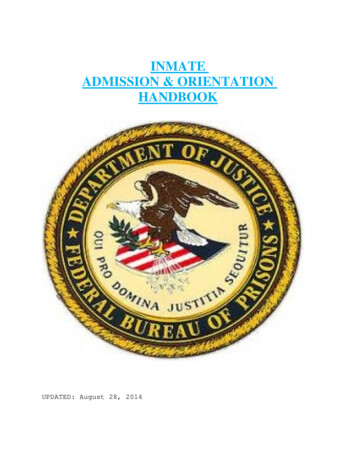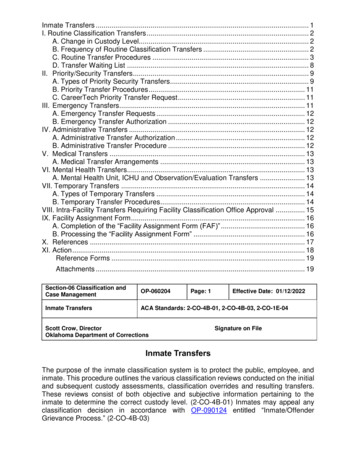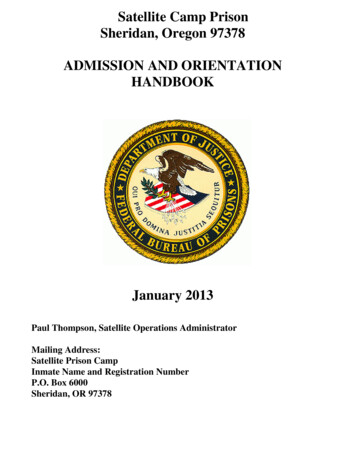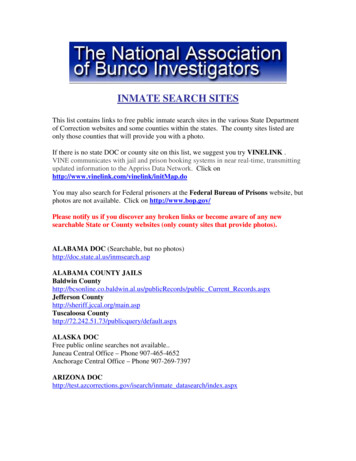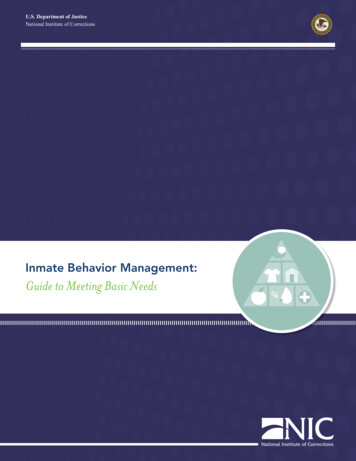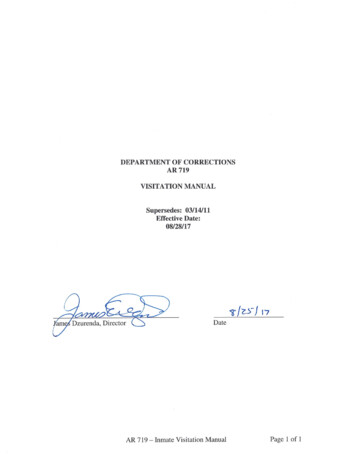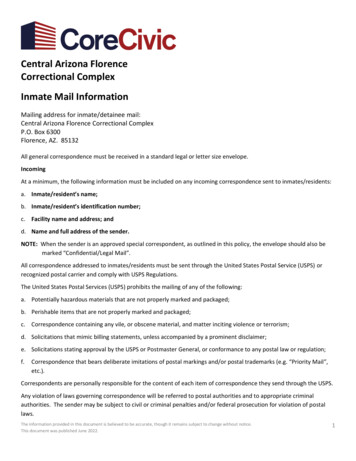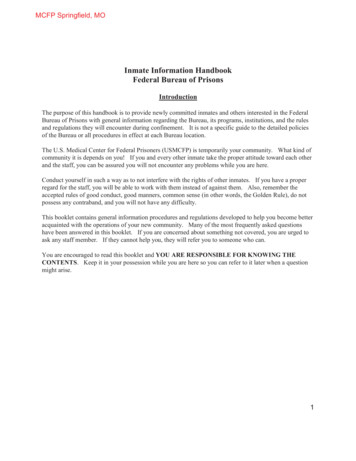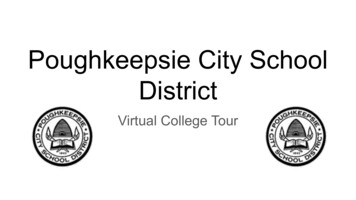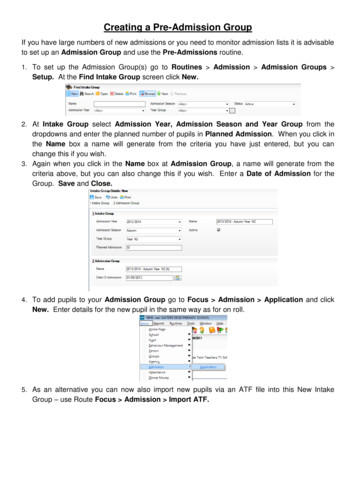
Transcription
INMATEADMISSION & ORIENTATIONHANDBOOKFDC MIAMI, FLORIDAUPDATED: June 20141
WARDEN’S INTRODUCTIONThe Federal Detention Center (FDC) is primarily a facility which houses U.S.Marshal Prisoners, both male and female. Our mission is to provide a safe andhumane confinement of inmates and detainees, many of whom are involved infederal court proceedings in the Southern District of Florida.At FDC Miami you have certain rights and responsibilities which are explainedin this booklet. Sanitation and personal hygiene are very important incommunal living. You will be required to maintain a high level of personalcleanliness and assist in the general cleaning of your housing unit. This isa non-smoking institution. If you are experiencing difficulty with not beingable to smoke, notify a member of your Unit Team for assistance.By carefully reading this booklet, you will have a better understanding of yourrights and responsibilities during your confinement at this facility. Anyarray of programs and services are available to you and are explained in generalterms. Your Unit Teams is available for any questions or concerns you may haveregarding the information contained in this booklet.W.T. Taylor, Warden20142
GENERAL INTRODUCTIONThe purpose of this handbook is to provide arriving inmates with informationregarding the Federal Detention Center (FDC)-Miami, Florida, its programs, andthe rules and regulations. It is not a specific guide to the detailed policiesof the FDC. Rather, the material in this handbook will help new inmates morequickly understand what they will be encountering when they enter prison, andhopefully assist them in their initial adjustment to incarceration.When you were received at this facility, you were given a Federal Register Numberwhich will identify you as long as you are in federal custody. That number iscommonly known as your “number” or “register number”. It is imperative foryou to provide your family and friends with your number so that you may receivecorrespondence from them while you are in our care. All mail and especiallyany money orders must be identified with your register number when received.You will be screened by a unit team member, and given a quarters’ assignmentbased on your personal profile and security needs. While in Receiving andDischarging (R&D) you were given a commissary card and a cell assignment. Cadreinmates (inmates designated to serve a sentence at FDC Miami) will participatein an Admission and Orientation Program as required by policy. During thatprogram they will receive additional guidance and unit rules that will applyduring their stay in the Cadre Unit.Other inmates, (Holdovers, Pre-Trial Inmates, Material Witnesses andImmigration Detainees) will receive an abbreviated familiarization and welcometo the facility. Rules and Regulations are posted in English and Spanish inall housing units and it is your responsibility to read and follow these rules.In the pages that follow, this booklet describes many departments which youmay contact during your stay in our facility. There is also a section on yourrights and responsibilities, and a description of the recreational, religious,psychological, medical, dental, and other programs that are here for yourbenefit. Please take the necessary time to read this pamphlet and keep it forfuture reference.3
ADMISSION & ORIENTATIONInmates are given a social screening by Unit Management staff and medicalscreening by Health Services and Mental Health staff at the time of arrival.Inmates are immediately provided with a copy of the institution rules andregulations, which include information on inmate rights and responsibilities.It also includes information on sexual assault and abuse.Within the first few days of your arrival, you will have a chance to meet withyour unit team. They will meet with you on a regular basis to discuss theresults of tests, interviews, and examinations given during theadmission/orientation period, and discuss institutional adjustment and relatedproblems and concerns (for designated inmates only). Your unit counselor canassist you with establishing a phone list, visiting list and attorney calls.Normally, a unit staff member is available each day of the week and most eveningsuntil 9:00 p.m. The unit bulletin boards and the TRULINCS system containwritten communication of interest to inmates.Unit Managers may utilizemonthly Town Hall meetings to dispense information and foster improvedcommunications. Unit team members will utilize either open house hours or anopen door policy to address inmate concerns. Inmates are also encouraged touse Inmate Requests to Staff or the TRULINCS system to make requests to staffin writing.Within 28 days of arrival (for designated inmates only), inmates willparticipate in the Admission and Orientation (A&O) Program. While in A&O,inmates are advised of the programs, services, policies and proceduresregarding the facility.UNIT MANAGEMENTYour Unit Team is comprised of the Unit Manager, Case Manager(s), CorrectionalCounselor(s), and a secretary.Unit Manager: The Unit Manager is the administrative head of the general unitand oversees all unit programs and activities.The Unit Manager is theChairperson of the team which comprises the Case Manager, CorrectionalCounselor, with input from Education and Psychology staff. The Unit Managerreviews team decisions and may chair the Unit Discipline Committee (UDC), whichis a body that hears disciplinary infractions. The Unit Manager is ordinarilypresent during initial classification and subsequent program review(s) in whichRRC placement is discussed.Case Manager: The Case Manager is responsible for all casework services and4
prepares classification material, progress reports, release plans,correspondence, and other materials relating to the inmate’s commitment. TheCase Manager serves as a liaison between the inmate, the administration, andthe community.Correctional Counselor: The Counselor provides counseling and guidance for theinmates of the unit in areas of institutional adjustment, personaldifficulties, and plans for the future. He/She plays a leading role in segmentsof unit programs relating to inmate activities. The Unit Counselor may conductcounseling groups for inmates in his/her unit and/or groups open to the generalpopulation.Unit Secretary: The Unit Secretary performs clerical and administrative duties,to include the preparation of release paperwork.Unit Officer: The Unit Officers have direct responsibility for the dailysupervision of inmates and the enforcement of rules and regulations. They havesafety, security, and sanitation responsibilities in the unit. Unit Officersare in regular contact with inmates in units and are encouraged to establishprofessional relationships with them, as long as such interaction does notinterfere with their primary duties. Unit Officers control movement in andout of the unit and conduct regular searches for contraband.Town Hall MeetingsTown Hall meetings are held to make announcements and to discuss changes inthe policy and procedures of the unit. Inmates are encouraged to ask pertinentquestions of the staff and any guest speakers who are present. These questionsshould pertain to the unit as a whole, rather than personal questions orproblems. Personal issues will be resolved by unit staff during the regularworking hours which are posted in each unit.Foreign ConsularThe most recent publication of the Consular Notification and Access directorywill be located in the Law Library.SCHEDULE OF UNIT SERVICES AND ACTIVITIES: A Schedule of Unit Activities andPrograms is posted on each unit bulletin board throughout the institution toinform you of that particular units unit based activities and programs developedand implement by the Unit Manager.PROVISIONS FOR HOUSING DISABLED INMATES:For those inmates that havedisabilities, see your unit managers for any housing or other needs you feelare necessary.5
ARTICLES FOR HYGIENE:Any inmate who is in need of hygiene items, see yourunit team within the unit you are staying.UNMONITORED LEGAL TELEPHONE CALLS: In the event unmonitored legalcorrespondence is not practicable, an inmate may request an unmonitored legaltelephone call. Unmonitored legal calls will be scheduled by cop-out inadvance with a member from your Unit Team. The call will take place on yourassigned unit.INTERNATIONAL TREATY TRANSFER PROGRAM: Pursuant to Program Statement 5140.34,Transfer of Offenders to or from Foreign Countries, an inmate who is qualifiedfor and desires to return to his or her country of citizenship for service ofa sentence imposed in a United States Court shall indicate his or her interestby completing and signing the appropriate form.During the initial application process, unit staff will suggest the inmatecontact the nearest foreign consular office to advise them of his or her desireto be considered for treaty transfer. Foreign officials normally havedocuments for the inmate to complete and return to the local consulate andcan also assist the inmate in providing proof of citizenship. Consularofficials may request to visit the inmate at the institution.ACCESS TO DIPLOMATIC REPRESENTATIVES: When it has been determined that aninmate is a citizen of a foreign country, the Warden must permit the consularrepresentative of that country to visit on matters of legitimate business. TheWarden may not withhold this privilege even though the inmate is in disciplinarystatus. The requirement for the existence of an established relationship priorto confinement does not apply to consular visitors.UNIT BASED PROGRAMS: A list of unit based programs is posted on the unit bulletinboards. All inmates may sign up for any class via an Inmate Request to Staffform. Any inmate not following the posted unit rules and regulations will besubject to disciplinary action.INMATE SMOKING CESSATION PROGRAM: This program addresses stress managementand other relevant topics. The program is offered thorough the psychologydepartment and based on inmate demand. Inmates should refer to ProgramStatement 1640.04 for instructions on enrollment in the Nicotine ReplacementTherapy Program.Designated InmatesWithin 28 days of arrival, inmates will participate in the Admission andOrientation (A&O) Program. While in A&O, inmates are advised of the programs,6
services, policies and procedures regarding the facility. Inmates initiallydesignated to the institution will receive initial classification within 28days of arrival. Unit, Education, and Psychology staff will assess each inmateand work with them to develop an individual plan which will address skilldeficits that may deter successful reentry into the community.Subsequent program reviews will be held every 90 to 180 days, depending uponrelease date. These are held by the Unit Team to review progress on programminggoals, work assignments, transfers, custody/security level, institutionaladjustment, etc. The inmate may not waive appearance with the Unit Team.Reentry Pre-Release ProgrammingRelease preparation begins on the first day of incarceration.The BOP’sreentry strategy provides inmates with the opportunity to gain the necessaryskills and resources to succeed upon release. Through coordinated effortsamong the departments in the institution and collaboration with other agencies,a wide array of programs and activities are offered to better inmates’ chancesof a successful reentry upon release.It is imperative at initial classification (Team) that inmates are open andhonest when answering questions to allow the team to accurately identify needsand make appropriate program recommendations to improve inmates’ chances ofa successful reentry. Each time an inmate goes to team, he or she will receivea progress update and new recommendations as warranted. Contributors andprogramming recommendations include Education, Health Services, Psychology,Unit Team, Recreation, Religious Services, the inmate’s Work Detail Supervisor,and the inmate. Inmates are strongly encouraged to take advantage of theprogram recommendations.Additionally, to make the transition back to the community go as smoothly aspossible, inmates should obtain at least two forms of identification to includea social security card. Inmates may also be eligible for some benefits uponrelease (e.g., social security disability, veteran’s, Medicare etc.) to makethe transition easier. Staff may be able to provide you with informationconcerning benefits so that you may determine your eligibility and begin theapplication and begin the application process if applicable prior to release.INMATE REQUEST TO REVIEW CENTRAL FILE: An inmate seeking to review his InmateCentral File shall submit a request to his Case Manager via Inmate Request toStaff Member. The inmate’s request will be acknowledged and will be permittedto review the file whenever practicable. All file reviews must be done underconstant and direct staff supervision. Those materials which have beendetermined to be non-disc losable shall be removed from the folder before inmatereview. An entry shall be made on the Inmate Activity Record (BP-381) to show7
the date the inmate reviews the file. The staff member monitoring the reviewshall initial the entry and the inmate shall be asked to initial it.UNSCHEDULED PROGRAM REVIEWS: Pursuant to CFR 524.14, upon request of eitherthe inmate or staff, a Program Review may be advanced. An inmate must providea compelling rationale to the Unit Team demonstrating his need for anunscheduled Program Review. The Unit Manager is the approving official.INMATE FIANCIAL RESPONSIBILTY PROGRAM:Working closely with theAdministrative Office of the Courts and the Department of Justice, the BOPadministers a systematic payment program for court-imposed fines, fees, andcosts. All designated inmates are required to develop a financial plan to meettheir financial obligations.These obligations may include: specialassessments imposed under 18 USC 3013, court ordered restitution, fines andcourt costs, judgments in favor of the U.S., other debts owed the Federalgovernment, and other court-ordered obligations (e.g., child support, alimony,and other judgments).Institution staff will assist in planning, but the inmate is responsible formaking all payments required, either from earnings within the institution orfrom outside resources. The inmate must provide documentation of complianceand payment. If an inmate refuses to meet his or her obligations, the inmatecannot work for UNICOR nor receive performance pay above the maintenance paylevel. He/She will also be placed in “refuse” status. As the result of beingin refuse status, the inmate has a spending limit of only 25.00 monthly, canbe placed in less desirable housing, will not be considered for any favorablerequests, i.e. (vacations, furloughs, early release, etc.) and will score zeroin responsibility on the progress report. These are a few examples of thesanctions that can be imposed as a result of being in refuse status.The status of any financial plan will be included in all progress reports, andwill be considered by staff when determining Security/Custody level, jobassignments, eligibility for community activities, and institutional programchanges. The U.S. Parole Commission will also review financial responsibilityprogress at parole hearings.INMATE SAVINGS ACCOUNT: If a designated inmate wishes to establish a savingsaccount, a member of the unit team shall assist the inmate in establishing anaccount at a local commercial bank. Any interest accrued in the savings accountis accrued in the inmate's name and becomes part of the account.Inmates should be advised that once the funds are placed in the savings account,they may only be withdrawn upon release, except in case of an emergency.Passbooks and other documents relating to the savings account shall be retainedin the inmate's central file and given to him upon release.8
Arrangements must be made with the savings facility to mail statements regardingdeposits, interest payments, and withdrawals directly to the inmate. (Step1.5.6)RELEASE GRATUITIES: Inmates being transferred to a Residential Reentry Centeror released may be given a reasonable gratuity, based on individual need tobe determined by policy and your Case Manager, with final approval by the CMCand/or Warden. You should save money for your release needs whileincarcerated.RELEASE CLOTHING: Inmates who desire release clothing to be sent in uponrelease or transfer to a Residential Reentry Center, should make a request totheir Counselor, no earlier than 30 days prior to their departure date fromthe institution. This clothing will be issued on the day of departure.A TYPICAL DAILY SCHEDULE IS AS FOLLOWS:06:00 am:Wake-up call - Breakfast served - Check daily Call Outs - Cleancells07:30 am:Rooms ready for inspection08:00 am:AM census count, cell inspections, and room checks10:45 am:Unit is closed for lunch meal11:00 am:Lunch meal served.01:00 pm:PM Census Count03:00 pm:Mail Call03:45 pm:Unit secured in preparation of the Official Stand-Up Count,along with recreation deck and leisure room. All inmates mustbe secured in the cells.04:00 pm:Official Stand-Up Count05:00 pm:Evening meal served09:30 pm:End of unit activities. Recreation deck and leisure roomssecured. Unit orderlies will clean the common areas.9
09:45 pm:Unit secured in preparation of the Official Stand-Up Count.All inmates are secured in the cells.10:00 pm:Official Stand-Up CountWeekends/Holidays07:00 am:Breakfast served09:00 am:Lights on, prepare cells for inspection09:45 am:Prepare for 10:00 AM Stand-Up Count10:00 am:Official Stand-Up Count12:00 pm:Brunch servedRest of day: Follow same schedule as weekday scheduleUNIT RULES AND REGULATIONS:FDC Miami rules and regulations are established to evaluate the progress andresponsibility of the individual inmate. Unit rules and regulations maintainan atmosphere conducive to sound rehabilitative efforts, and allow the inmateto reside in a safe and sanitary environment. Inmates are required to haveknowledge of the unit rules and regulations and to abide by these rules andregulations at all times.1.All initial cell and bunk assignments / changes will be assigned by a memberof the Unit Team.Inmates with proper bottom bunk medical slips will beassigned to bottom bunks.2.All rooms must be cleaned daily. Rooms must be ready for sanitationinspection and must remain ready, Monday through Friday, from 7:30 a. m.until 3:30 p.m. On weekends and holidays rooms must be cleaned by10:00 a.m.3.Once beds have been made, inmates may lay on top of the bed.4.Legal materials will be stored in your locker. If additional legal storagespace is needed, you must submit a written request to the Unit Manager. Legal10
boxes will contain only legal material. Legal reference material or booksfrom the law library are not allowed in your room at any time. These itemsare for all inmates to use and may not be removed from the law library.5.You will not have in your possession any property which is not specificallyauthorized by policy or which belongs to another inmate. Inmates are notallowed to give property to each other unless authorized by Bureau ofPrisons staff.6.Inmates are not allowed to visit in another inmate’s room.7.Upon being moved to another cell, unit, or out of the institution, you willremove all personal property and linen. Your cell will be completelycleaned before departure. Pillows, lockers, and mattresses are assignedto cells and may not be removed from the cell or unit unless directed byunit staff.8.Unit and special counts will be announced by the Unit Officer. You willcomply with all count procedures as prescribed in this A&O handbook.Interruption of count procedures will not be tolerated. The 4:00 p.m. and10:00 a.m., 10:00 p.m. counts are Official Stand-Up Counts.9.All recreation and leisure games will be played in the designated areas.Games will be checked in and out from the unit officer on a daily basis,utilizing your ID card. Games may not be stored in your room.10. You may not own more than one approved radio and one headset. Proof ofownership per Form 40 or commissary receipt is required. Altered radioswill be confiscated and an incident report will be written.11. The recreation deck will be opened at 9:00 a.m. or after the unit has metsanitation standards. There is NO SMOKING.12. Inmates will be allowed access to telephones from 6:00 a.m. through 9:45p.m.Each inmate is limited to 300 minutes per month. All calls arelimited to fifteen minutes. Telephones are turned off during count times.13. Showers will open from 6:00 a.m. until 7:30 a.m., and will be closed from7:30 a.m. to 3:00 p.m. Monday through Friday. Only one (1) shower per tierwill be available for inmate use prior to 3:00 pm. On weekends and holidays,showers will be available from 7:00 a.m. to 3:45 p.m. and will re-open afterthe evening count.14. A call-out sheet/change sheet is printed daily and distributed to the UnitOfficer. It will be posted after 4:00 p.m. on the day prior to your11
appointment. You are responsible for viewing the call-out sheet/changesheet daily and being available for your appointment(s).15. Inmates must have their commissary ID card in their possession at all times.Inmates who do not have a commissary card will submit a written request tothe counselor. If an inmate loses his/her card, he/she will be responsiblefor paying a 5.00 replacement fee.16. Inmates must be fully dressed during all meals and when outside of theirrooms. Underwear will not be worn as shorts in the unit. Unit orderlies mustbe dressed in full uniform during assigned working hours. From 7:30 a.m.to 3:00 p.m., Monday through Friday, inmates must be in full uniform.17. During all official unit inspections, inmates must be fully uniformed andstand outside their room door until inspection is completed.18. During fire drills, inmates must follow evacuation procedures when the alarmsounds. Improper use of the fire alarms will result in disciplinary action.Evacuation routes are posted within the unit. For the safety of allinmates, fire drills will be conducted quarterly with a drill occurring onevery shift. Staff will evacuate inmates to the recreation deck. Shoulda real emergency arise, follow the staff's direction. Fire drills aredesigned for the safety of inmates and staff. Failure to comply with anyfire drill will result in disciplinary action.GROOMING:Appearance is important in making a positive impression on others, as well asproviding you with a feeling of general wellbeing and personal satisfaction.You are expected to maintain a neat and clean personal appearance at all times.It is your responsibility to keep yourself clean and well groomed.Institution clothing will be worn during the normal workday, except for thoseinmates going to the recreation yard. The hours of the work day are from7:30 a.m. to 3:00 p.m. Cadre Unit inmates will have your shirts neatly tuckedin and pants will be worn appropriately around the waist. The pants leg willnot be bloused, flared, or altered from issued condition. The t-shirt mustbe tucked in. If you desire to wear a sweat shirt, the sweat shirt must be tuckedin. Safety shoes are required in work areas. All other units will wear a greenjumper.There is no restriction on hair style or length of hair; however, hair willbe clean and neatly groomed at all times. If it is likely that long hair willresult in a work injury, hair nets or caps will be worn. Beard masks will berequired for persons working around food. Inmates will not be allowed to wear12
faddish hair styles, which may signify gang affiliations. No shapes or designswill be cut in the hair or other unorthodox practices. You may not wear wigsor artificial hair pieces unless authorization is granted by the Medical ReviewCommittee, with the approval from the Warden.BARBER SERVICE:Hair care services are available to all inmates. Barber kits are brought tothe units on a weekly schedule. Unit Barber Orderlies are assigned on everyhousing unit to perform hair cutting services on each unit. The Barber Orderlieswill be supervised by the unit officer while cutting hair on the housing unitrec-yard. A barber schedule is maintained for the inmate barber crew while onthe assigned unit.INMATE REQUEST TO STAFF MEMEBER AND THE ADMINISTRATIVE REMEDY SYSTEM:If you cannot resolve a complaint through informal contact with staff, or throughan "INMATE REQUEST TO A STAFF MEMBER" form (commonly referred to as a "COP-OUT")or via the TRULINCS system; and if you wish to file a formal complaint for anadministrative remedy, you may obtain the form "REQUEST FOR ADMINISTRATIVEREMEDY" (BP-DIR-329) from your unit counselor who is charged with logging andtracking each complaint. The form must be returned to your Unit Counselor tobe processed. An attempt must be made to informally resolve an issue beforeit is referred to the Warden's Office.Your complaint must be filed within fifteen (15) calendar days from the dateon which the basis of the complaint occurred. Only one complaint is permittedon each submission. The Warden has twenty (20) calendar days from receipt ofthe complaint to act upon the matter, and provide a written response.If you are not satisfied with the Warden's response, you may file an appeal withintwenty (20) days via BP-DIR-330 form to the Southeast Regional Director. TheBP-330 form can be obtained from your unit counselor who is charged with theresponsibility of logging and tracking this form. The Regional Director hasthirty (30) calendar days upon receipt of your appeal to respond. If you arenot satisfied with this reply, you may file a final appeal to the AssistantDirector, Office of General Counsel and Review, Bureau of Prisons, within thirty(30) days of receipt of the Regional Director's response. This should be doneon form BP-DIR- 331 and include a copy of the BP-329 and BP-330. Within thirty(30) calendar days, a written response will be made.13
MAIL:OUTGOING MAIL: A secure mail depository for outgoing general and "Special Mail"(see section pertaining to "Special Mail") is located near the Unit Officer'sstation in every housing unit. Work cadre (designated), sentenced/un-sentencedholdover and pretrial inmates are required to place their general mail in thedepository UNSEALED. Outgoing mail is collected from the depositories everyday, excluding weekends and federal holidays, no later than 8:00 a.m. You arereminded that you are responsible for the contents of the letters you mail.Correspondence containing threats, extortion, etc., may result in prosecutionfor violation of federal law. All outgoing mail must display a complete returnaddress on the upper left hand corner on the front of the envelope (see examplebelow). The return address must include your committed name. Your committed nameis the name used by the arresting officer as noted on the detention order at thetime of your admission to this facility, or the name which appears on your Judgment& Commitment Order at the time of sentencing. Please notify your correspondentsnot to address mail using nicknames or aliases. If you have a hyphenated lastname, ensure your incoming and outgoing mail displays both surnames. The returnaddress portion of the envelope and all incoming correspondence and publicationsshould be completed as follows:Your committed name and register numberFederal Detention Center MiamiP. O. Box 019120Miami, FL 33101-9120Writing paper, envelopes, pens, pencils and unsigned greeting cards are providedby the Federal Detention Center, and may not be obtained from outside sources.You may purchase additional items from the commissary. You must affix properpostage. Unit staff, through the Mail Room, will assist you in determining properpostage. Postage stamps of various denominations are available through theinstitution Commissary. Stamps or stamped items may not be received throughthe mail. You may not purchase, or have in your possession, more than sixtyfirst-class stamps. International, certified, registered, insured and returnreceipt mail services are provided upon request. Contact your correctionalcounselor if you do not have sufficient funds to purchase postage stamps.POSTAGE STAMPS FOR INDIGENT INMATES: An inmate who has neither funds norsufficient postage and who wishes to mail legal mail (includes courts andattorneys) or Administrative Remedy forms will be provided the postage stampsfor such mailing. To prevent abuses of this provision, the Warden may imposerestrictions on the legal and administrative remedy mailings. (See ProgramStatement 5265.11, Correspondence)14
INCOMING MAIL: All mail is picked up daily at the U.S. Post Office exceptweekends and federal holidays. Incoming mail is delivered to the inmatepopulation within twenty-four (24) hours of receipt; authorized packages withinforty eight (48) hours. Mail call is held in the housing unit AT 3:00 pm.,Monday through Friday. All incoming inmate general correspondence is openedand inspected. Unauthorized items (contraband) are removed and returned tosender with a form letter explaining the reason for rejection. You will receivea copy of any rejection notice at mail call.These are examples of items commonly returned to sender as "nuisance" contraband:Postage stamps or stamped envelopesUnsigned greeting cardsMusical greeting cardsBlank stationeryNewspapers not forwarded by the publisherComplete sections of a newspaperExcess books or magazines in one packageDouble-faced Polaroid photographsNude personal photographsPlastic novelty itemsFunds are collected and deposited into your Inmate Trust Fund Account byFinancial Management staff for New Arrest/New Commit inmates only. See IncomingFunds on proper ways to receive money through Western Union and through the mail.INCOMING PUBLICATIONS: Newspapers, hard and soft covered books and magazinesmust come directly from the publisher, book store or book club. You may nothave in your possession, or r
The purpose of this handbook is to provide arriving inmates with information regarding the Federal Detention Center (FDC)-Miami, Florida, its programs, and the rules and regulations. It is not a specific guide to the detailed policies of the FDC. Rather, the material in this handbook will help new inmates more
